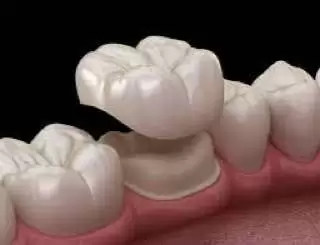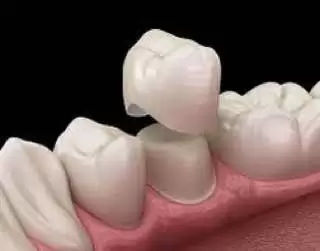creating beautiful smiles
Dental Crowns
A dental crown is a tooth shaped cap that covers the entire tooth and is used to restore a broken, heavily filled or a cracked tooth to its original size, shape and tooth color.
To ensure a proper fit, a dentist will need to remove a small amount of your tooth outer layer before bonding your new crown in place. Then a Dental technician will craft your crown from a variety of materials, including resin, metal and porcelain.


What my patients love the most about having a crown?
1. Often appears and feels like natural teeth
2. Can improve appearance of teeth dramatically
3. Can protect teeth with cracks that may be otherwise sensitive or unsightly
4. They are long lasting
5. The process is painless
2. Can improve appearance of teeth dramatically
3. Can protect teeth with cracks that may be otherwise sensitive or unsightly
4. They are long lasting
5. The process is painless
What my patients dislike the most about having a crown?
1. Can break or fracture over time
2. Can trap bacteria and lead to decay if they don’t fit properly
3. May be expensive
4. Appointments can be long
5. If you wear a night guard or a retainer, it may need to be replaced after a crown
2. Can trap bacteria and lead to decay if they don’t fit properly
3. May be expensive
4. Appointments can be long
5. If you wear a night guard or a retainer, it may need to be replaced after a crown
What are benefits of dental crowns:
1. Restoration of Tooth Structure: Crowns restore damaged or decayed teeth by covering them, preserving their structural integrity.
2. Protection: They provide a protective barrier against further damage, preventing fractures or decay.
3. Improved Appearance: Crowns enhance the aesthetic appeal of a tooth, addressing discoloration or irregularities.
4. Durability: Crowns are durable and can withstand the forces of chewing and biting, offering long-term reliability.
5. Functional Improvement: Crowns contribute to improved tooth function, especially after procedures like root canals.
6. Customization: They can be customized in shape, size, and color, ensuring a natural and seamless blend with existing teeth. 7. Longevity: With proper care, dental crowns can last for many years, providing a durable and reliable solution.
2. Protection: They provide a protective barrier against further damage, preventing fractures or decay.
3. Improved Appearance: Crowns enhance the aesthetic appeal of a tooth, addressing discoloration or irregularities.
4. Durability: Crowns are durable and can withstand the forces of chewing and biting, offering long-term reliability.
5. Functional Improvement: Crowns contribute to improved tooth function, especially after procedures like root canals.
6. Customization: They can be customized in shape, size, and color, ensuring a natural and seamless blend with existing teeth. 7. Longevity: With proper care, dental crowns can last for many years, providing a durable and reliable solution.
What types are crowns are available?
1. Porcelain-fused-to-Metal (PFM): Combining strength of metal with natural appearance of porcelain, suitable for back teeth.
2. All-Ceramic or All-Porcelain: Known for aesthetic appeal, metal-free, making them a good choice for front teeth.
3. Metal Crowns (Gold or Base Metal Alloys): Durable and less tooth structure removal, often chosen for molars.
4. Zirconia Crowns: Strong and durable, with a natural appearance, suitable for various teeth.
5. E-max Crowns: Made of lithium disilicate ceramic, offering strength and esthetics, commonly used for front teeth.
6. Stainless Steel Crowns: Frequently used for temporary solutions in children and as a covering for primary teeth.
What happens during the dental crown procedure?
Fitting a crown usually requires two appointments with me.
First visit:
1. Preparing your tooth- To make space for the new crown I will need to remove some of your natural enamel. To build a strong foundation for the crown I will replace any existing fillings in the tooth / remove decay and fill as necessary.
2. Dental Impression- Next I will take impressions of the prepares tooth and the opposing teeth . These may be physical impressions taken with a putty-like material or digital impressions taken with a handheld scanner. These impressions will be sent to the dental lab and a highly skilled technician will construct your custom dental crown.
I use the best dental technicians in London which I have personally inspected their facilities and discussed my patient’s needs with them.
3. Temporary crown placement- It usually takes two weeks, sometimes a little longer, for the technician to make your crown. While you are waiting for your crown, I will place a temporary crown for you to go home with.
Second visit:
1. I will remove the temporary crown
2. We will check the shape, cloud and fit of the new crown together
3. I will then bond the crown to your tooth using a strong dental cement
Does it hurt to have a tooth prepared for a crown?
No. A local anesthetic is used and the preparation should feel no different to that of a filling. If the tooth does not have a nerve and a post crown is being prepared, then local anesthetic may not be needed.
How to take care of your crowns?
Dental crowns require the same level of care and attention as your natural teeth.
* Brush your teeth with fluoride tooth paste after each meal and before bedtime, especially at the gum line
* Floss at least once or twice a day
* Rinse with fluoride rinse before bedtime
* If you experience teeth grinding or clenching (bruxism), we need to discuss using a custom mouth guard
* Avoid excessively hard, crunchy, or chewy foods
* Visit your dentist for annual check-up
The life of a crown will depend on how well it is looked after. The crown itself cannot decay, but decay can start where the edge of the crown joins the tooth. It is very important to keep this area as clean as your other teeth, or decay may occur which could endanger the crown.
Crowns (or bridges) can also be placed onto implant abutments as a restoration.
How long do crowns last?
The average lifespan of a dental crown is five to 15 years. If you notice wear, tear or damage, it’s time for dental crown replacement.

